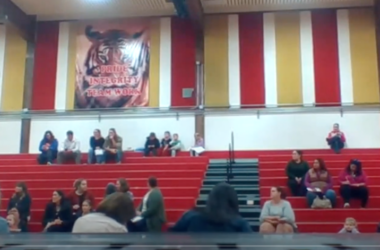The quickest way for a public official to get my attention is to dishonor their office.
Many have come into my view over the years.
The crooked state senator.
The corrupt sheriff or two.
The thieving state executive.
And more.
Watching out for such disreputable people in Oregon is a key obligation of reporters. But the ranks of journalists in the state are shrinking. That means errant public officials are less likely to make news for picking the taxpayers’ pocket, doing government favors for friends or simply wielding power with arrogance instead of duty.
And such reporting seems more often to land with less impact. Too many readers and viewers don’t trust the work of journalists. And, as a country, our attention is splintered a thousand directions.
But, still, I retain the idealism that carried me into this profession 50 years ago.
I have been thinking about where we are as a state and a country and the media’s role as I reflect on a half century as an Oregon journalist.

My career in Oregon journalism has been built on good fortune.
My father, Clarence, was a newsman, too, though he never pressured me to follow him. Instead, he came home one day with a 1963 high school textbook called “Press Time.” I was in grade school, but I devoured the lessons, doing them over and over.
I had the good fortune of having a high school journalism teacher – Don Wilt – who saw and nurtured potential. I had the good fortune of editors at the Oregon Statesman in Salem who put me to work as a general assignment reporter just days after high school graduation in 1973. From there, I spent time at the University of Oregon and Portland State University while always holding down professional assignments. I joined The Oregonian in 1976, left to buy a weekly newspaper in 1987, and returned to the Portland paper in 2000.
My instinct for investigative reporting came early. In high school, I investigated the schools’ athletic department for absorbing money from other departments to cost overruns, getting the report published in the afternoon daily as a high school correspondent.
In the years that followed, I honed those investigative skills – how to dig out records, how to win the confidence of fearful sources, how to confront a public official without fear. I had no ambition for anything other than to develop powerful stories about powerful people and institutions.
But along with those skills came a deepening appreciation for fairness, for ethical behavior. When I turned to community journalism with the acquisition of the Keizertimes in 1987, those lessons were potent. I still recall being too zealous to tell about a mayor parking his boat for free at city hall’s secure lot. The story was accurate, but it wasn’t entirely fair. The breathless account turned a minor infraction into a front-page scandal.
Temperance in investigative reporting is critical. Good journalists have to question every fact. They have to constantly ask themselves: Is this story fair? Is the wording fair? That doesn’t mean diluting the facts. That means giving the facts and letting readers decide just how foul the offense is.
My good fortune has meant reporting on some of Oregon’s biggest stories – the DC-8 jetliner that crashed in Portland in 1978, the eruption of Mount St. Helens in 1980, the arrival in 1982 and the criminal conduct of leaders of a bunch from India known as the Rajneeshees.
Good fortune came to me at The Oregonian, where trusting editors allowed me time and resources to pursue major investigative projects, from corrupt disability employment programs to drug cartels. Any good journalist succeeds only with good editors, and my career has been marked by a string of them. Dick Thomas, Stephen Engelberg, Amanda Bennett, Therese Bottomly – they were all excellent mentors.
In 2016, I retired from The Oregonian. I truly thought I was headed for long days fixing fence and riding horses at my eastern Oregon ranch. But duty to the profession, to Oregon, kept tugging at me. My family bought the Malheur Enterprise in Vale, Oregon. In 2018, I was recruited to start up the digital news operation Salem Reporter. And in 2021 I took the lead to found the Oregon Capital Chronicle, the digital state news service.
Why? I became increasingly alarmed at the demise of news organizations, the rise of partisan news sites and the erosion of American trust in the press, in the truth.
Study after study showed the plunge in trust of the news. And any chart of newspaper circulation looked like a swimmer’s trajectory off a diving board – down, down, down.
In every speech I give these days, whether to Rotary or League of Women Voters, I acknowledge that the media shares the fault. For too many years, collectively we have exuded an arrogance that readers and viewers sensed – and then rejected. We have been too slow to admit our errors, to be open with how we do our work. We left you in the dark.
Experiences in Vale and in Salem impressed on me key truths.
First, citizens remain hungry for local information they can trust. Journalists must deliver more.
Second, citizens are counting on the press to serve as watchdogs. Sitting in a school board meeting, performing stenography, does not illuminate what readers need to see. News organizations need to replace routine reporting with probing coverage.
Third, young journalists themselves want standards to live by. Interns and beginning journalists absorb lessons in fairness, accuracy and integrity. Experienced journalists owe them the time and guiding hand to pursue this profession.
Finally, I have faith in you and other Oregonians. We may seem to be in a rough patch politically and socially at the moment. But the power of the truth, of the facts, has time after time in our country’s history won out over hyperbole and manipulation. In the press, we have work to do to help get us there. My optimism that we can is what keeps me going.

Les Zaitz is editor and publisher of the Malheur Enterprise and editor and CEO of Salem Reporter.
NEWS TIP? Send an email to [email protected].
HOW TO SUBSCRIBE – The Malheur Enterprise delivers quality local journalism – fair and accurate. You can read it any hour, any day with a digital subscription. Read it on your phone, your Tablet, your home computer. Click subscribe – $7.50 a month.



